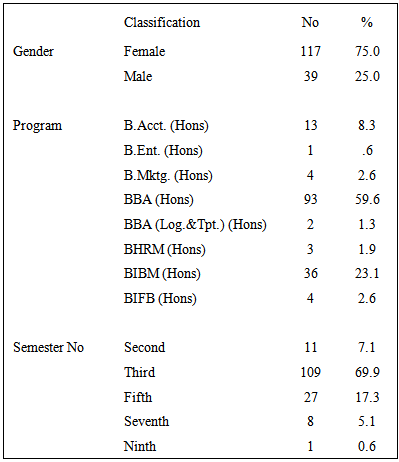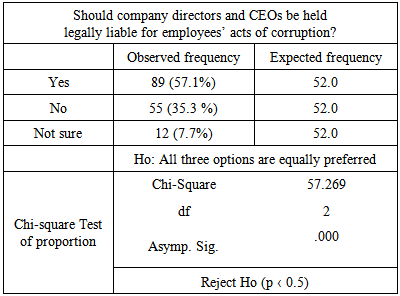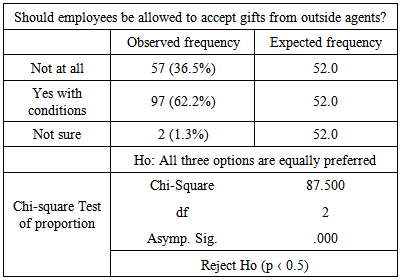-
Paper Information
- Next Paper
- Previous Paper
- Paper Submission
-
Journal Information
- About This Journal
- Editorial Board
- Current Issue
- Archive
- Author Guidelines
- Contact Us
American Journal of Economics
p-ISSN: 2166-4951 e-ISSN: 2166-496X
2015; 5(2): 95-97
doi:10.5923/c.economics.201501.08
Exploring Malaysian Business Undergraduates’ Perceptions on Managing Corporate Corruption
Yen Wan Chong, Saari Ahmad
Department of Business Management, Universiti Utara Malaysia
Correspondence to: Yen Wan Chong, Department of Business Management, Universiti Utara Malaysia.
| Email: |  |
Copyright © 2015 Scientific & Academic Publishing. All Rights Reserved.
Corruption is a serious problem faced by many countries, including Malaysia. Despite intensifying anti-corruption efforts, corruption in Malaysia has remained a serious problem. Although corruption has often been perceived as predominantly a public sector problem, the private sector is involved in most cases of government corruption. Ensuring good corporate governance is one of the ways to combat corruption. This study examined the perceptions of business undergraduates on two new initiatives to curb corruption and promote good corporate governance in Malaysia, namely the “No Gifts Policy” that has been adopted by several Malaysian companies and the proposed introduction of a new legislation in Malaysia which is similar to the recently enacted UK Bribery Act 2010. The new legislation plans to impose legal liability on company directors and CEOs for failure to prevent their employees from engaging in acts of corruption.
Keywords: Business ethics, Corporate governance, Bribery, Corporate gifts policy
Cite this paper: Yen Wan Chong, Saari Ahmad, Exploring Malaysian Business Undergraduates’ Perceptions on Managing Corporate Corruption, American Journal of Economics, Vol. 5 No. 2, 2015, pp. 95-97. doi: 10.5923/c.economics.201501.08.
Article Outline
1. Introduction
- Corruption is a serious problem faced by many countries in the world, including Malaysia. Despite various anti-corruption campaigns and efforts, the social corruption menace in Malaysia has remained acute, widespread and may have even deteriorated in recent years [1]. Corruption causes significant harm, especially in developing countries. The consequences of corruption includes wastage and misallocation of limited economic resources, hurts economic growth, exacerbation of poverty conditions, undermines the rule of law, creates uncertainty in the enforcement of regulations and lower confidence in public institutions [2]. Although corruption has often been perceived as predominantly a public sector problem, the private sector is not always the victim [3]. As the private sector is involved in most cases of government corruption, the Malaysian government is reported to be mulling over the possibility of introducing a new legislation that will hold company directors and chief executive officers who have not put in place reasonable amount of anti-corruption preventive measures liable should their employees be found to have committed graft. This proposed initiative is line with the latest global developments which saw the enactment of new anti-bribery laws in many countries including the UK Bribery Act in the United Kingdom. Under the recently enacted UK Bribery Act of 2010 and the long established US Foreign Corrupt Practices Act of 1977, senior business executives can be prosecuted if they fail to prevent their employees and corporations from engaging in corrupt practices. While global anti-bribery laws have generally punished top management who knew or participated in acts of corruption, recent legal developments have found senior executives liable even when they have no knowledge alleged of the pertinent bribery [4]. Another anti-corruption initiative that was introduced recently in Malaysia was the adoption of the “No Gifts Policy” for company staff. Malaysian companies that have implemented a “No Gifts Policy” include Media Prima Bhd, Petronas and Telekom Malaysia. Contemporary anti-corruption campaigns have viewed the giving and receiving of gifts with suspicion as gifts may create conflicts of interest. Receiving a gift causes the feeling of gratitude in the receiver, which in turn creates a perceived obligation to reciprocate [5]. On the other hand, giving and receiving gifts has long been a feature in the business culture in many countries, particularly in Asia. Gifts may help to foster relationships with external stakeholders and has the potential to create bonding value [6]. In view of the above, this study examined the attitudes of business undergraduates on the two new controversial initiatives to curb corruption and promote good corporate governance in Malaysia, namely on the “No Gifts Policy” already adopted by several Malaysian companies and the proposed imposition of legal liability on company directors and CEOs for their failure to prevent their employees from engaging in acts of corruption.
2. Methodology
- This study employed a combination of quantitative and qualitative approaches in order to achieve a better understanding of the perceptions of business undergraduates on the moral dimensions of corporate corruption. The data presented in this paper is part of a larger research project. The research instrument was a self-administered survey questionnaire containing open-ended and close-ended questions. Valid responses were obtained from 156 business undergraduates enrolled in a business ethics course at a public university in Malaysia which specializes in management education. The profile of the respondents are presented in Table 1.
|
3. Results
- The results of two research issues are included in this section. The data was coded and analyzed using SPSS. The Chi-square test for proportion was used as test of statistical significance. The Chi-square (χ2) test was used to test hypotheses Ho for equal proportion.
3.1. Liability for Corporate Corruption
- The preliminary findings on the following research question is presented in table 2.
|
3.2. Corporate “No Gifts Policy”
- The preliminary findings on the following research question is presented in table 3.
|
4. Conclusions
- It is heartening to note that most business undergraduates in Malaysia are supportive of the introduction of an anti-bribery legislation similar to the UK Bribery Act and the long established US Foreign Corrupt Practices Act. This move would encourage top management to establish organizational processes and policies and ensure good corporate governance which is key in all efforts to curb corporate corruption. On the other hand, most business undergraduates are of the view that employees should be allowed to accept gifts from outside agents under certain conditions.Corruption and acceptance of corporate gifts which causes conflict of interests to arise are morally wrong from the business ethics perspectives. Further analyses will be conducted on the respondents’ open ended responses to gain insights on the dominant ethical orientations, i.e whether based on religious ethics, utilitarianism, ethics of care, virtue ethics, principles of justice or moral rights considerations.
 Abstract
Abstract Reference
Reference Full-Text PDF
Full-Text PDF Full-text HTML
Full-text HTML

